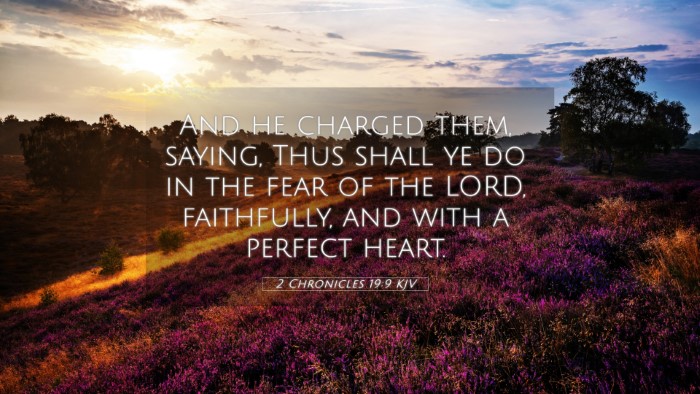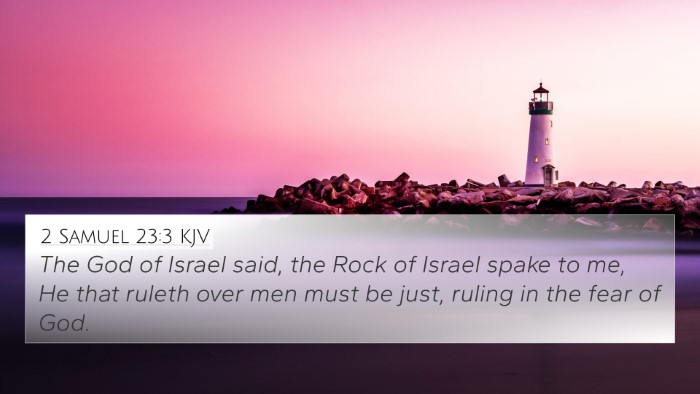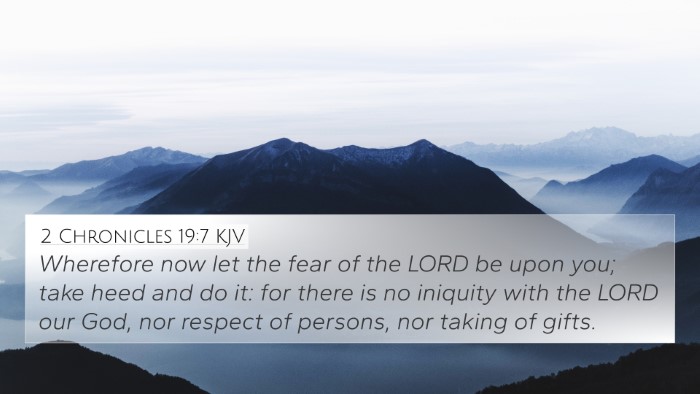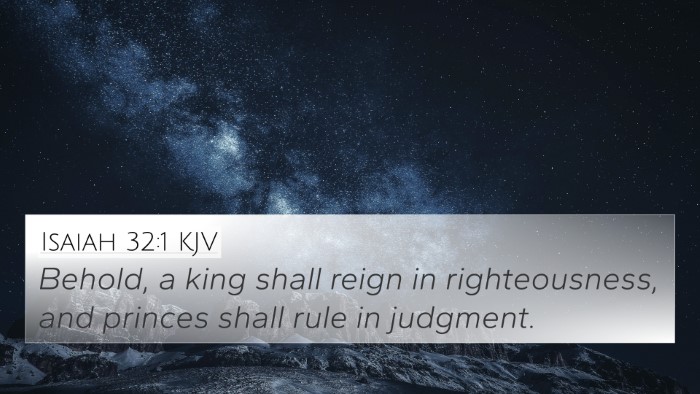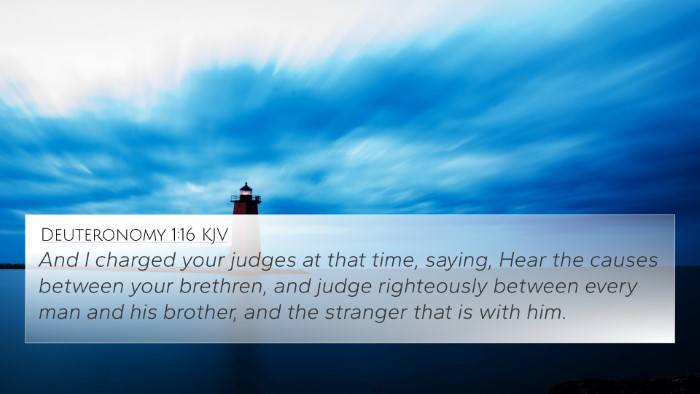Understanding 2 Chronicles 19:9
Contextual Overview: This verse is part of a narrative where Jehoshaphat, the king of Judah, is making reforms aimed at restoring the nation’s adherence to the worship of Yahweh. Jehoshaphat appoints judges to arbitrate disputes and establishes a judicial system that emphasizes righteousness and adherence to God's law.
2 Chronicles 19:9 (KJV): "And he charged them, saying, Thus shall ye do in the fear of the LORD, faithfully, and with a perfect heart."
Commentary Insights
-
Matthew Henry:
Henry emphasizes that Jehoshaphat’s charge to the judges is a call to act with reverence before God. They are to maintain integrity and be impartial in judgment, reflecting God's character in their rulings. This highlights God’s expectation for leaders to govern with justice and truth, which is vital for a righteous society.
-
Albert Barnes:
Barnes points out that the fear of the Lord is foundational in all aspects of life, particularly in governance. He interprets the command to serve faithfully as an admonition that the judges must not only decide cases objectively but also consider the moral and spiritual implications of their decisions in line with divine expectations.
-
Adam Clarke:
Clarke builds on this view by noting that the phrase "with a perfect heart" implies a total commitment to one's duties. He argues that true service to God entails emotional and spiritual integrity - that judges must not be swayed by personal interest or external pressures, which corrupt righteousness.
Thematic Connections
-
Fear of the Lord: This theme resonates throughout scripture, linking this verse to Proverbs 1:7, which states, "The fear of the Lord is the beginning of knowledge." It reinforces the necessity of reverence for God as a starting point for wisdom in decision-making.
-
Justice and Righteousness: This concept is echoed in Micah 6:8, which declares, "He has shown you, O mortal, what is good. And what does the LORD require of you? To act justly and to love mercy and to walk humbly with your God." This mirrors Jehoshaphat's intention to uphold righteousness through his appointed judges.
-
Faithfulness: The importance of faithfulness in service can also be connected to 1 Corinthians 4:2, which mentions that "it is required of stewards that they be found faithful." This showcases that the expectation of fidelity is a timeless doctrinal principle relevant across both Testaments.
-
Integrity in Leadership: This connects to Titus 1:7-9, where Paul speaks of the necessity for leaders in the church to be blameless, emphasizing the expectation of integrity and moral uprightness synonymous with Jehoshaphat's establishment of righteous judges.
-
Judgment according to God's Law: This principle is highlighted in Romans 2:6, "God will repay each person according to what they have done." Here, the expectation that judges operate under divine law resonates with the charge given by King Jehoshaphat.
-
Judicial Accountability: Seen in Hebrews 4:13, "Nothing in all creation is hidden from God’s sight", this emphasizes God's watchfulness over justice, reinforcing Jehoshaphat's message about the serious nature of their duties as judges.
-
God’s Sovereign Rule: This is reminiscent of Psalm 89:14, where it states, "Righteousness and justice are the foundation of your throne." This establishes God's governance model, which Jehoshaphat seeks to emulate through establishing righteous judgments.
Cross-References
To further explore the themes and connections of 2 Chronicles 19:9, the following cross-referenced Bible verses provide deeper insight:
- Proverbs 29:14: "The king who judges the poor with integrity—his throne will be established forever." This verse underscores the importance of just leadership as emphasized by Jehoshaphat.
- 2 Samuel 23:3: "The God of Israel said, The Rock of Israel spoke to me: He who rules over people righteously, who rules in the fear of God," which highlights the correlation between righteous governance and the fear of God.
- James 3:17: "But the wisdom that comes from heaven is first of all pure; then peace-loving, considerate, submissive, full of mercy and good fruit, impartial and sincere." This enforces the need for judges to be wise and impartial, aligning with Jehoshaphat's directives.
- Deuteronomy 16:18: "Appoint judges and officials for each of your tribes in every town the LORD your God is giving you, and they shall judge the people fairly." This establishes a precedent for just rule that Jehoshaphat sought to implement.
Practical Application
This verse delivers profound lessons for modern believers and leaders alike:
- Understanding the gravity of one's role in leadership or judgment calls for maintaining faithfulness and integrity.
- Reflection on how one can integrate the fear of the Lord into everyday decisions, ensuring they align with biblical standards of righteousness.
- Recognizing the significance of justice as a fundamental principle of governance, whether in civil leadership or personal conduct.
Conclusion
2 Chronicles 19:9 serves as a vital reminder of the standards by which God's people are called to uphold justice and righteousness. Through cross-referencing with other scripture, we gain a richer understanding of how these principles interweave throughout the biblical narrative, connecting various books and teachings to form a cohesive understanding of God’s expectations for His leaders and followers today.
Delving into cross-referencing methods can enhance one's study of Scripture, providing insight into the wider implications and interconnections of biblical themes - a valuable tool not just for leaders, but for any believer seeking to live a life reflective of God's justice and holiness.

